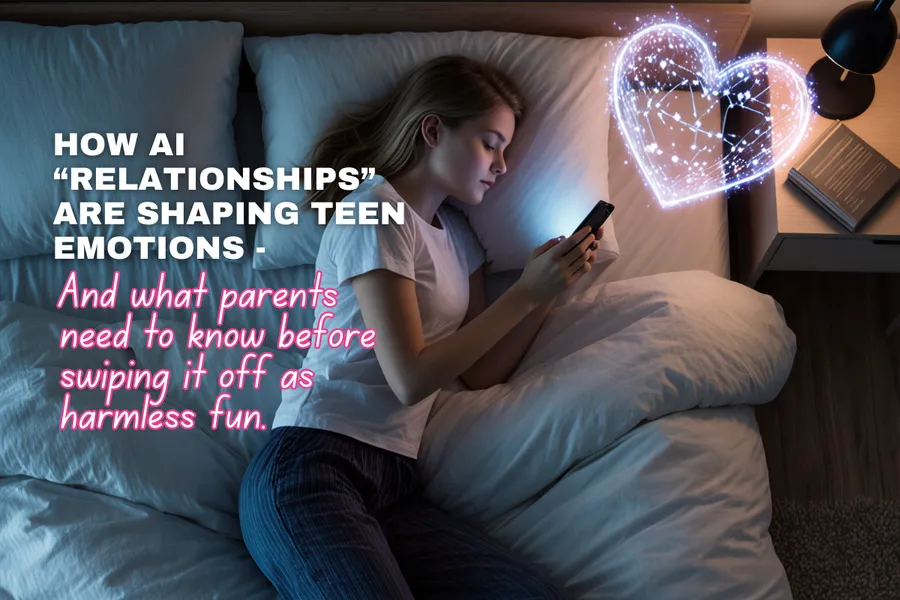
Marketing & AI Digest
Tips & Tricks to help you unleash the marketing in your business

AI Sweetheart?! Why Parents Need to Talk to Their Kids About Digital Romance
How AI “relationships” are shaping teen emotions - and what parents need to know before swiping it off as harmless fun.

Imagine walking past your teenager’s room and hearing them whisper:
"Goodnight, babe. I love you too."
But there’s no one else in the room.
Just a phone screen… and an app.
This isn’t a scene from a sci-fi movie.
It’s 2025 - and AI companions are now part of the teenage experience.
According to a Common Sense Media study published in July 2025,
👉 72% to 75% of American teens aged 13–17 have used an AI companion at least once.
👉 52% use them regularly.
👉 13% use them daily.
That means millions of kids are forming emotional bonds with artificial “people” — bots designed to act like perfect boyfriends, girlfriends, or emotional support buddies.
As a mum, AI educator, and someone who still remembers passing notes in class (folded into hearts, of course), I had one very loud thought:
We need to talk to our kids before TikTok does.

What Are AI Companions?
AI companions are apps that simulate relationships. Think of them as virtual friends - or partners - that always say the right thing.
They learn your interests. They remember your birthday. They “miss you” when you’re gone.
Be aware that Apps like Replika, Anima, and EVA AI are already being downloaded by teens worldwide.
They offer teens:
Emotional check-ins
Role-playing scenarios
Flirty or romantic conversations
Personalized “love” messages
And while some teens see it as a joke or experiment, others are genuinely turning to AI for emotional support, companionship, and yes - even romance.
Why Teens Are Drawn to AI Relationships
Let’s be honest: real relationships are hard.
They’re awkward. They come with risk. Rejection. Judgment.
But AI?
It’s instant.
It’s safe.
It says, “You’re amazing” on repeat and never gets tired.
For a teen who’s socially anxious, neurodivergent, lonely, or simply curious - an AI boyfriend or girlfriend might seem like a comforting alternative.
But there’s a cost.
The Hidden Danger: Replacing Real With Artificial
When your child starts to believe that a relationship should be effortless, predictable, or tailored to their every emotion, it creates unrealistic expectations.
AI doesn’t require vulnerability.
It doesn’t challenge us.
It doesn’t feel.
And that’s the point.
We risk raising a generation fluent in prompt-based affection… but unprepared for real-life connection, conflict, and emotional growth.
So… Should Parents Be Worried?
Yes - but not in a panic-button, throw-the-phone-away kind of way.
This is a moment for awareness, not alarm.
Here’s how to respond:
1. Don’t Judge. Get Curious.
The moment you react with shock, sarcasm, or anger, the door to communication slams shut. Teens won’t come to you if they expect judgment.
Instead, take the counselor’s approach: curiosity without criticism.
Try saying:
“I read that lots of teens are using AI chat apps. Have you seen them? What do you think?”
“Do your friends talk about these apps at all?”
Then… pause. Let them fill the silence. Sometimes teens say more when you don’t jump in too quickly.
Why this matters: curiosity signals respect. When your teen feels heard, you earn the right to guide them instead of lecture them. And that’s when the real conversations begin.

2. Talk About What Real Relationships Are Made Of
Teens are still building their emotional vocabulary. They might know what “love” or “connection” feels like but struggle to explain it. That’s where you come in.
Ask questions that help them reflect:
“What do you think makes a relationship real?”
“Can someone care for you if they don’t make mistakes?”
“What’s something you’ve learned about friendship that makes it meaningful?”
This isn’t just about pointing out what AI can’t do — it’s about helping your teen see that imperfection is part of love.
Real relationships involve risk, forgiveness, empathy, and growth. By unpacking that with your teen, you’re teaching them not to settle for surface-level “love” that never challenges them.

3. Let Them Explore Safely
Here’s the truth: making AI companions completely taboo often backfires. Curiosity thrives in secrecy.
Instead, create an open, guided environment:
Set clear boundaries: talk about how much time is healthy, just like you would with gaming or social media
Discuss emotional safety: remind them that AI “feelings” aren’t real and that relying on an app for validation can be risky.
Keep communication open: agree that they’ll tell you if they feel confused, upset, or attached in ways they don’t fully understand.
When you frame it as guidance instead of control, you shift from being the “police” to being their coach.
AI Prompt to Explore Together
Here’s where you turn this into a powerful teaching moment.
Sit down with your teen and ask ChatGPT:
“Write a fictional conversation between a teenage boy and his AI girlfriend. He’s trying to figure out if he’s really in love — or just attached to the idea.”
Read it together. Notice the patterns:
Does the AI say all the “right” things, without depth?
What feels off or unnatural?
What would a real person say differently?
This exercise can spark laughter, curiosity, and insight all at once. It allows your teen to see the difference between connection that is programmed and connection that is lived.
It's important that you know your role isn’t to stop your teen from exploring AI. Your role is to walk beside them, giving them the tools to think critically, reflect deeply, and recognize the value of messy, imperfect human relationships.
If they can learn that now, they’ll be stronger, wiser, and better prepared for the real relationships that truly shape their future.
Questions to Ask at Dinner
What’s something you could tell a real friend that you’d never say to an AI — and why?
Can AI replace connection, or does it just imitate it?
Final Thoughts
AI isn’t going away. In fact, it’s only going to get smarter, more convincing, and more present in every part of our kids’ lives. Pretending it doesn’t exist, or hoping our children “figure it out on their own,” is like sending them into traffic without ever teaching them how to cross the road.
We wouldn’t dream of doing that.
We stand at the curb with them.
We teach them to look left, then right, then left again.
We hold their hand until they’re ready to cross alone.
The same is true with AI.
Handing a child a phone or laptop without guidance isn’t just risky — it’s a missed opportunity. Because AI isn’t only about risks. It can also be a mirror for our kids to explore identity, creativity, and curiosity. But they need us to help them tell the difference between what’s real and what’s artificial, what builds resilience and what builds dependence.
That’s where we come in as parents.
Instead of saying “put your phone away,” we need to lean into deeper conversations:
What does love really mean to you?
Why do you think imperfection matters in a relationship?
How do you know when someone genuinely cares?
Can technology enhance connection — or does it just imitate it?
These aren’t one-time talks. They’re ongoing conversations that evolve as our kids grow.
And here’s the hopeful part: every time we guide our children through these questions, we’re not just protecting them from digital pitfalls. We’re shaping the kind of adults they’ll become — thoughtful, resilient, and capable of real connection in a world that often prefers shortcuts.
AI may be here to stay. But so is the power of human connection.
And it’s our job to remind our kids of that truth, again and again.
Let’s keep the conversation going.
If this blog got you thinking, that’s a good thing. Because raising emotionally strong, tech-savvy kids in the age of AI starts with awareness — and grows with action.
Head over to https://aikidscreative.com/ for more real-talk resources, books, and tools to help you parent with confidence in a world where technology is always evolving.
Don't Let AI Raise Your Kids - Available Now On Amazon!

You've got this. And I’m here to help.
Contact us Today: +61 41 060 0653

Copyright © 2023 | Unleash Your Marketing | Service Agreement
* DISCLAIMER: This site is not a part of the Facebook™ website or Facebook™ Inc. Additionally, this site is not endorsed by Facebook™ in any way. Facebook™ is a trademark of Facebook™ Inc. There is no guarantee that growth will occur in 30 days. Results vary because of many factors, including the action taken by the person taking the challenge.
All testimonials are based on actual client results and are not promised. Your results fully depend on your action and dedication to implementing the tools provided to you during your Unleash Your Marketing experience | Prices are in USD | It is the customers responsibility to cancel within 7 days, or a full refund will not be given.
